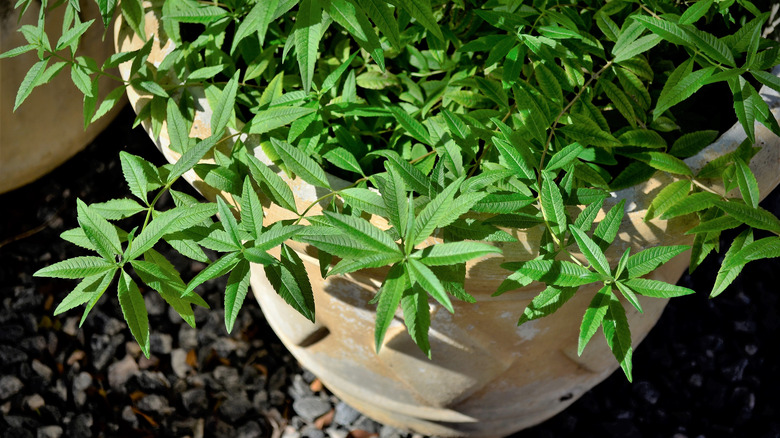Plant Lemon Verbena Near Your Outdoor Sitting Areas And You Won't Regret It
Pest control can be frustrating. Bugs swarming around your front porch or cozy backyard sitting area can cause itchy bites and uncomfortable buzzing. But, repellent sprays, candles, and devices are typically either ineffective or laden with chemicals. As a result, you might find yourself avoiding these outdoor spaces, instead choosing to cozy up indoors regardless of how much you'd like to enjoy the pleasant breeze and sunshine outside. Thankfully, however, lemon verbena (Aloysia citrodora) can offer a solution to your bug problem, along with a host of other benefits that ensure it's a good plant to keep around.
You might be familiar with lemon verbena as an ingredient in expensive soaps and lotions, but this freshly fragranced herb is much more accessible than those hefty price tags would have you believe. As it turns out, it's an incredibly simple plant to grow at home, and it can make a great addition to your existing porch or garden setup, especially if your goal is to repel bugs naturally.
Benefits and uses for lemon verbena
One of lemon verbena's main draws — and the reason it's such a great choice to plant near an outdoor seating area — is its ability to repel bugs. This plant releases quite a bit of fragrance that most people find pleasant, but bugs can't stand. As a result, you'll likely notice a decrease in everything from spiders to mosquitos if you decide to plant lemon verbena near your porch or patio.
As a bonus, lemon verbena is edible and a fairly common inclusion in light, summery dishes. Pluck a few leaves to add to your chicken seasoning blend, or boil them down into a simple syrup to spice up your tea or lemonade. Additionally, lemon verbena leaves will create a citrusy tea. If you're not ready to experiment with lemon verbena in the kitchen, you can also create a fragrance oil or water to spray around your home for some added freshness.
How to care for lemon verbena
Lemon verbena is native to the Mediterranean, so it's no surprise that this plant thrives in full sun, a warm climate, and well-draining soil. If you live somewhere balmy and sunny year-round, feel free to plant lemon verbena straight into your existing beds if the soil is an appropriate mix. If the soil doesn't drain well, however, you might end up with root rot, which causes the plant to drop leaves and eventually die.
If you live somewhere that gets chillier during the winter months, you can also choose to keep your lemon verbena in a pot and bring it inside once temperatures start to drop. Before you decide to take it indoors, cut back on the amount of water you're giving the plant so it will fall dormant. Once the weather warms up, place it back on the patio and start up your regular watering routine to enjoy the bug-repelling benefits once more.


